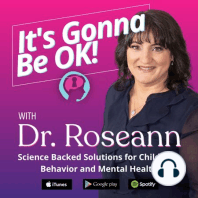35 min listen

160: What is Sensory Processing Disorder
FromScience Backed Solutions for Children’s Behavior and Mental Health
160: What is Sensory Processing Disorder
FromScience Backed Solutions for Children’s Behavior and Mental Health
ratings:
Length:
13 minutes
Released:
Feb 5, 2024
Format:
Podcast episode
Description
Sensory processing issues can affect a wide range of people, regardless of neurotypical or neurodivergent status, and can sometimes be linked to developmental factors. The key question then is what turns these issues into a clinically recognized disorder. In today’s episode, I want to delve into one of my favorite topics that many neurodivergent individuals, including some neurotypical ones, struggle with – sensory processing disorder.Sensory processing disorder and its impact on daily life.Sensory processing, at its core, involves receiving information through our senses. When our nervous system is functioning properly and regulated, we can tolerate loud sounds or someone touching our shoulders without feeling bothered. However, when it's dysregulated, we become reactive and so, we struggle to modulate the sensory input we receive.I've had the opportunity to work closely with kids on the autistic spectrum or those dealing with ADHD who often face challenges related to taste and texture, particularly in the context of eating. While some children may go through a developmental phase where these difficulties naturally resolve, it becomes a sensory processing disorder (SPD) when it significantly interferes with their daily functions. This can manifest in various aspects of their lives, such as disrupting sleep, hindering school performance, or impacting other routine activities, posing a challenge that parents need to actively manage. On a positive note, addressing these clinical issues often leads to resolution. However, some individuals may grapple with sensory processing challenges for an extended period. Sensory processing disorder and its relationship to autism and other conditions.When it comes to understanding sensory processing disorder (SPD) in comparison to conditions like autism or other clinical issues, it's crucial to note that many individuals on the autism spectrum commonly experience sensory processing challenges. From my experience, most people in the autistic spectrum navigate a balance with sensory information – some may be under-sensitive, seeking activities like constant spinning for stimulation, while others may be overreactive, displaying heightened responses to seemingly mundane stimuli like a flushing toilet. These reactions provide clues to an underlying reactivity of the nervous system, indicating the presence of sensory processing challenges.It thus becomes essential to emphasize that individuals with sensory issues aren't intentionally causing disruptions; for them, it's similar to the discomfort of nails on a chalkboard. Everyday activities, such as people chewing, can be profoundly disruptive for some children, making it challenging for families to maintain a sense of normalcy.Understanding the difference between SPD and autism is important. While almost all people with autism may also have SPD, not everyone with SPD has autism. SPD can be linked to various physical issues like problems with cell function, joint laxity, ADHD, rejection-sensitive feelings, avoidance of demands, anxiety, depression, or OCD. And sometimes, sensory challenges are connected to primary issues like anxiety or depression, making the nervous system more active.Sensory processing issues in children with autism and how to help them.Supporting kids with sensory processing issues requires patience and a proactive approach. Personally, I've found value in being proactive rather than reactive. Addressing these challenges involves a hands-on approach, including the use of a sensory diet – a personalized set of activities to help the child manage sensory information better. While working with an occupational therapist is recommended, a sensory diet is a practical tool for effective support.Navigating sensory processing challenges involves proactive engagement, individualized strategies, and the
Released:
Feb 5, 2024
Format:
Podcast episode
Titles in the series (100)
20: Fasting for Anxiety and Depression by Science Backed Solutions for Children’s Behavior and Mental Health